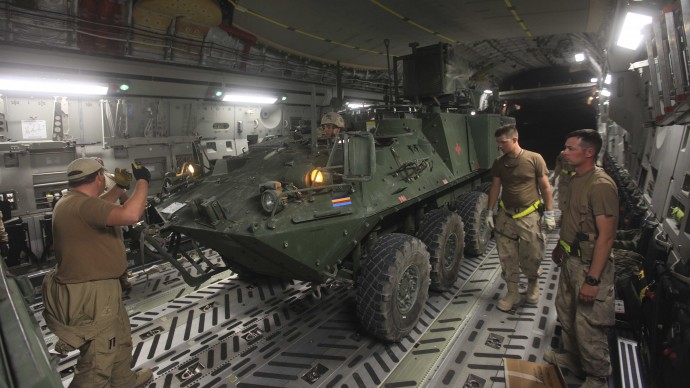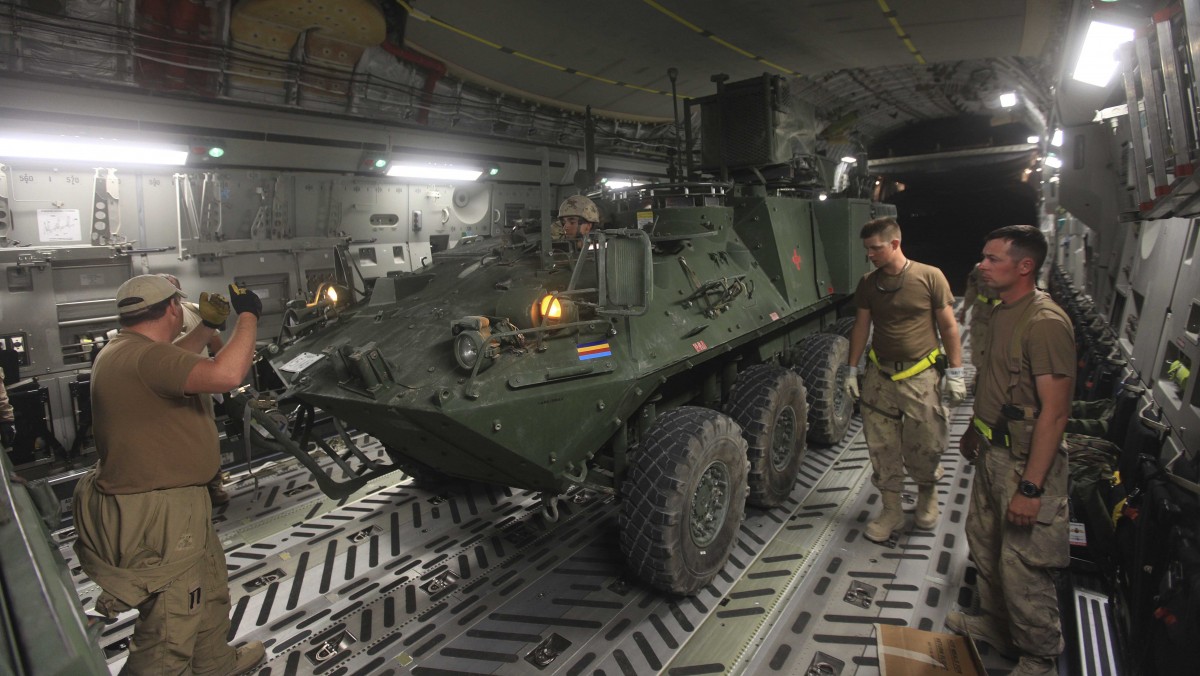
(MintPress) – Canada, the global superpower?
It’s not the powerful title the world would expect the unassuming country to identify with, but the conservative leaders of America’s northern neighbor are steadfast on transforming Canada into an economic and military force to be reckoned with.
In a speech at the General Assembly of the United Nations (U.N.) earlier in the fall, Canadian Minister of Foreign Affairs John Baird cemented the country’s ambition and goals to the rest of the world.
“We recognize that the well-being of Canadians depends both on openness at home and on openness to the world. Canadians know from experience the connection between trade and prosperity,” Baird emphasized. “After all, in order to support the world’s 10th-largest economy with only the world’s 36th-largest population, we must be a trading nation. We are expanding trade at a rate of unparalleled ambition, and consequently we’re looking for partners.”
Baird’s forward thinking blueprint for Canada was just a microcosm for what is already happening in the country. But policies implemented in Canada have not gone without criticism, as claims of it mirroring alleged “police state” practices often seen in the United States have critics saying Canada’s quest for power is coming at the expense of its citizens.
In the face of conservative policies brought forth by Canadian Prime Minister Stephen Harper, Canada has become a mirror of sorts when compared to the U.S. An expanding military budget to purchase more military vehicles is similar to the reluctance American Republicans have of cutting the defense budget in light of today’s political climate. Claims of attacking workers’ wages have been sparked by Canadian unions after Harper proposed a “pay-less wage model” And like conservatives in the U.S., Canadian lawmakers proposed reductions to meat inspection very similar to the ones made during reductions to the United States Department of Agriculture (USDA).
Countries believe the hype
Outside of the most densely populated cities found in the country’s southern beltway, Canada sits on a vast expansion of natural resources that it has already put on the trading block with the rest of the world. According to the Boston Globe, unprecedented amounts of timber, water, gold and oil have launched its worth to new heights. In 2011, the International Monetary Fund showed that Canada’s gross domestic product (GDP) outpaced the U.S. by more than $2,000 per capita. The Canadian dollar has also accumulated more value than the Swiss franc and U.S. dollar – now ranking as one of the top 15 currencies in the world.
At the center of Canada’s economic boom is Alberta, which the CIBC World Markets says is using its natural resources to drive its economic success. Alberta has far and away led Canada in economic growth rates, outpacing the country’s 2.2 percent average with a 3.5 percent market. Todd Hirsch, senior economist with ATB Financial, said the only thing that may be slowing Canada’s momentum is the sluggish global market, particularly the markets of some of its closest allies – the U.S. and Europe.
“The problems are due largely to Europe’s zombie-like condition and the haunting prospect of the U.S. economy slipping back into recession,” Hirsch told the Calgary Herald. “The lower figure may spook markets, but it is unlikely to scare the Bank of Canada because it had already lowered its overall growth forecast for the national economy.”
That hasn’t stopped Canada from expanding its trade options on the global market, however. Two of the world’s established and growing economies, China and India, have developed closer business ties with Canada. Matt Tedford, a national leader at KPMG, a network of financial and professional firms, said Canada’s entrance onto the global stage means it will be reliable, secure and calculated in its trading practices. That’s something, Tedford points out, that developing countries look for in a trading partner.
“It’s not just oil and gas, it’s not just potash,” Tedford said. “Some of the recent investments in iron ore and base metals say a lot about the driving economic indicators in some of these emerging markets that make deals or partnerships with Canadian companies attractive.”
Growing military, growing concerns
In line with Canada’s economic bravado is its attention paid to the country’s security and military. But while Canadians tend to find value in the country’s economic gains, they show a sense of hesitancy when Harper and his cabinet talk about expanding its military presence around the world. Over the summer, more than 1,400 Canadian military personnel flocked to the Hawaiian Islands for a multinational military exercise that included the U.S. Canadian Defence Minister Peter MacKay, who had already hinted in the past of Canada growing its presence in the Asia Pacific region.
“It makes perfect sense we would increase our presence there,” MacKay said. “We have commercial ties in Asia Pacific – an economic powerhouse – and we have to improve our trade presence and relationships there. So, while this is a military exercise, it also allows us to have face time with some of those major trading partners.”
Domestically, Canada’s main military struggle may simply be not having enough hands on deck to help with the military’s expansion. After purchasing thousands of new armored vehicles – from tanks to trucks – Canada found itself with a shortage of Army technicians to help with maintaining them. Military officials within the country say with the current recruiting efforts, the size of the military should be adequate by 2014. Over the summer, Canada also awarded a $600 million contract to U.S. defense mogul Textron for a fleet of Tactical Armored Patrol Vehicles.
Critics have often said Canada’s emphasis on building security has made it a mirror of new policies in America that skeptics say make it parallel to a police-like state. In the U.S., crackdowns on Occupy protesters and its long-lasting war on drugs have fostered widespread practices of militarized police and usage of security cameras in public.
When demonstrations erupted in Montreal in response to drastic tuition hikes for universities in Quebec throughout the spring, police responded in military garb and arrested largely peaceful protesters. In one night in May, more than 500 people were arrested during protests that filled the streets of Montreal. Police told protesters that it was illegal for them to gather and demonstrate on the streets without proper notice, and arrests were made on the grounds of attending an unlawful assembly.
“It makes a lot of people angry,” said Martine Desjardins in May, who represented university students. “We fear that tonight, because there will be more demonstrations going on, people will become a bit more violent, because as you saw yesterday, when you are peaceful, you get arrested.”
According to the Centre for Research on Globalization, the U.S. and Canada have joined forces to implement cross-border intelligence sharing and law enforcement operations in the name of counterterrorism and the war on drugs. The agreement says the countries will cooperate in using technology, shared intelligence and surveillance to meet their objectives. In the U.S., groups like the American Civil Liberties Union (ACLU) have denounced the surveillance and retention of information for practices such as facial recognition technology and Automatic License Plate Recognition (ALPR).
“The privacy issues arise with the retention of the information,” the ACLU has written. “A police officer will not forever remember the exact location and time of an innocent motorist’s travels. With ALPR technology, those details can be stored indefinitely, creating an ever-growing historical record of the daily comings and goings …”
For some Canadians, the hustle and bustle of becoming a prominent figure on the world’s stage is something that feels out of character for the country’s moral fabric and general demeanor.
“I think we’re so embarrassed by it, to be honest,” said Adrienne Silnicki of the Council of Canadians, a progressive organization. “We’re watching this happen and it’s so out of touch with the Canadian reality. … Who our government promotes us to be is not who we are.”


